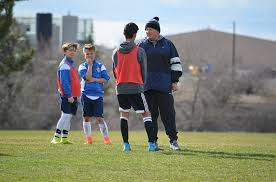You’ll have seen some of the sport headlines in bold letters; “fall out between coach…
Coaching Family Members
THE INS AND OUTS OF COACHING/TRAINING RELATIVES
Many aspiring athletes and teams are coached by their friends/family and consider themselves as “family-just-for-fun team(s).” Often we think of it as; helping out, filling a void temporarily and usually isn’t accompanied with skilled insight on what type of training, skills, set up etc actually need to be passed on. A negative connotation that gets flung around is: living your life through your son, daughter, team whatever. However, there can be many benefits to coaching/training family in the context of sport IF…you do it correctly.
[siteorigin_widget class=”WP_Widget_Media_Image”][/siteorigin_widget]
HOW COACHING/TRAINING FAMILY MEMBERS CAN IMPROVE YOUR RESULTS
One of many great things about coaching/training relatives is that you already have a relationship with them and likely know them much better than those that don’t. To build a team or individual athlete that performs, you need a variety of different skills, backgrounds and personalities. Due to your relationship with that particular family member or friend, you’ll already know how they operate and/or fit in with the rest of the team and can quickly integrate them into your daily routine.
Coaching/Training family in sport can also inspire the rest of your family and friends to join in. It can have a wider impact spreading to the community inviting wider participation and potentially leave a legacy transcending “just you and me working together”. Many family members will have more of a vested interest in your activities and your success than most other coaches/trainers, especially if the baton gets passed on. This can lead to more dedication and an ownership mentality, which can set a good example for the rest of your team, family, and community.
WHEN COACHING/TRAINING FAMILY MEMBERS BACKFIRES
If you don’t treat your family members like the rest of the team, allow them to come in late or leave early, or promote them ahead of more talented, put in all effort working and even qualified athletes, your actions could cause a toxic team culture and ultimately hurt your performance. Your other team members could start to wonder if you really value them or are playing favouritism and your retention of key team members could, but likely will suffer.
You also run the risk of hurting your relationship outside the sporting field if your relatives team members involvement does not go as planned and you need to discipline or kick them out. That’s why it’s vital to talk to them before they are even accepted and explain that your personal relationship is independent of your team/sporting status. Having trouble getting through to them on this issue? It might be a sign they wouldn’t make a good athlete/team member and that you should focus on them as a friend or family member rather than a player or your athlete.
[siteorigin_widget class=”WP_Widget_Media_Image”][/siteorigin_widget]
HOW TO COACH/TRAIN A FAMILY MEMBER
Still believe coaching/training a family member makes sense? While you can’t control how your other players/athletes view your decision, you can build a process around the way you coach/train family members to increase your chances of success. Be transparent on what factors, tests, results, attitude, work ethic, screening processes you use for selection. Have all the results listed leaving nothing to the imagination. ALL your candidates follow the same process making it as unbiased as possible and ensuring they’re the right team fit.
- ASK THE RIGHT QUESTIONS
Do your relative’s passions align with your athletic goals and mission? Will the position they fill leverage their skills and interests? Are they truly the best fit for the role you’re considering them for, or do you owe them a favour? Have them AND yourself, take the DISC profile assessment to better understand what drives and ultimately fulfils them AND yourself. The discussion should be a two-way street, with both of you striving to figure out if this is a decision that will benefit everyone involved.
- GAUGE THEIR PERSONALITY FIT
Personality is key when bringing someone into your (sporting) hopes and dreams – whether it involves coaching/training a relative(s) or not. Your close knowledge of your family member puts you at an instant advantage. While of course there must be a reasonable level of technical skill, it’s the soft skills – interpersonal skills, communication styles, thought processes and emotional intelligence – that can really make or break your coaching/training decisions. Coaching/Training family members whose behaviour and values oppose yours and those of your direct/indirect surrounding team will, over time, erode your chemistry and destroy morale.
- EXAMINE CORE VALUES
Core values are what you and/or your team stand for and they’re derived from your ultimate purpose. They are your team’s creed and culture and what every team member, family member, community member and/or volunteer should embody. Before coaching/training family in a sports setting, clarify your core values and make sure your relative knows what will be expected of them. The smaller your team, the more important it is to define how these core values should be manifested in each particular position.
- SEPERATING SPORT FROM LIFE
While coaching/training family members can be fun and rewarding, we all lose our cool at times. Most of the time when we have a blow out, it’s nothing personal. We’re humans dealing with the ups and downs of emotions, expectations and pressures. Ideally there is a safe space where we can lose our temper (within reason of course) without experiencing negative consequences. There is a time for talking sport, evaluate training and analyse post game/race performance AND there is a time where you resume your family dynamic relationship. Include times, areas where you do and when you don’t discuss any sport coaching/training. Keep in mind that when coaching/hiring a family member, you are also required to disclose any potential conflict of interest to outside involved team members.
- MAKE THE RIGHT CHOICE
If you do end up coaching/training a relative, you must hold them accountable like any other team member and ensure that the standards and expectations you set are not just met, but exceeded. A high-performing family member who is held to the same standards as the rest of the players/team members will gradually be accepted as a valued athlete, not just the relative of the coach/trainer who was hired to coach/train. This, in turn, can raise standards throughout the team and/or organisation and lead to further organic growth.
Coaching/Training a (sports) team is a complicated endeavour and coaching/training family members can make it even more challenging. Though there are plenty of pitfalls that can occur when you work with family, there are just as many upsides when it’s done right. Think of Rafael Nadal and his uncle Tony. Think of Andy Murray and his mother. Think of Danny Blind and his son Daley Blind (Football, Ajax). Think of Michael Jordan and his father.
Some dynamic (family) coach/athlete examples have a lasting transformative impact on that sport, and the legacies they leave behind.


